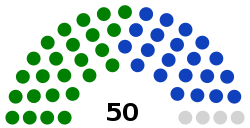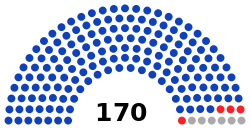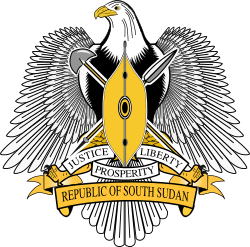National Legislature (South Sudan)
| National Legislature of South Sudan | |
|---|---|
| Type | |
| Type | |
| Houses |
Council of States (upper house) National Legislative Assembly (lower house) |
| Leadership | |
Speaker (Assembly) |
James Wani Igga Since 9 July 2011 |
Deputy Speaker (Assembly) |
Lawrence Lual Lual Since 9 July 2011 |
| Structure | |
 | |
Council of States political groups | Vacant constituency (4) |
 | |
National Legislative Assembly political groups | Independents (6) |
| Elections | |
National Legislative Assembly last election | Sudanese general election, 2010 (elections to predecessor body) |
| Meeting place | |
| Juba | |
 |
|---|
| This article is part of a series on the politics and government of South Sudan |
| Constitution |
|
|
| Foreign relations |
|
Related topics |
The National Legislature of South Sudan[1] is the legislature of South Sudan. The National Legislature consists of:
- The National Legislative Assembly; and
- The Council of States.
The National Legislature has its seat in Juba, South Sudan.
Role
The legislative competences of the National Government of South Sudan are vested in the National Legislature in respect of all matters assigned to it in Schedules A, C and D of the Transitional Constitution (read together with Schedule E of the Transitional Constitution).[2] The National Legislative Assembly exercises the following functions[3]
- Overseeing the performance of the National Government institutions;
- Approving plans, programmes and policies of the National Government;
Approving budgets;
- Ratifying international treaties, conventions and agreements;
- Adopting resolutions on matters of public concern;
- Summoning Ministers to answer questions of members of the Assembly on matters related to their ministries;
- Interrogating Ministers about their performance or the performance of their ministries;
- Approving appointments as required by the Transitional Constitution or the law;
- Casting a vote of no confidence against the Vice President and any Minister;
- Enacting legislation to regulate the conditions and terms of service of the Judiciary and its oversight mechanisms; and
- Performing any other function as determined by the Transitional Constitution or the law.
Eligibility
A candidate for membership of the National Legislature must:
- be a South Sudanese;
- be at least twenty-one years of age;
- be of sound mind;
- be literate; and
- not have been convicted during the last seven years of an offence involving honesty or moral turpitude.
Members of the National Legislature and the Council of Ministers are eligible for membership of state legislatures or state councils of ministers. A member of the National Legislative Assembly cannot also be a member of the Council of States (and vice versa). The term of the National Legislature shall be four years from July 9, 2011.[4] The Constitution is a transitional Constitution and the terms relating to future general elections are not contained in it. However, there are provisions included for by-elections should vaccancies arise during the first four-year period.
History
The establishment of the National Legislature is one of the new institutions created upon the independence of South Sudan in 2011. In substance, it is also a successor to the Southern Sudan Legislative Assembly, itself established in 2005 by the Constitution of Southern Sudan.
See also
References
- ↑ Art. 55(1) of the Transitional Constitution of the Republic of South Sudan gives the body its name stating - "There shall be established a National Legislature..."
- ↑ Art. 55(2) of the Transitional Constitution of the Republic of South Sudan
- ↑ "Account Suspended". www.goss.org.
- ↑ Art. 66 of the Transitional Constitution of the Republic of South Sudan